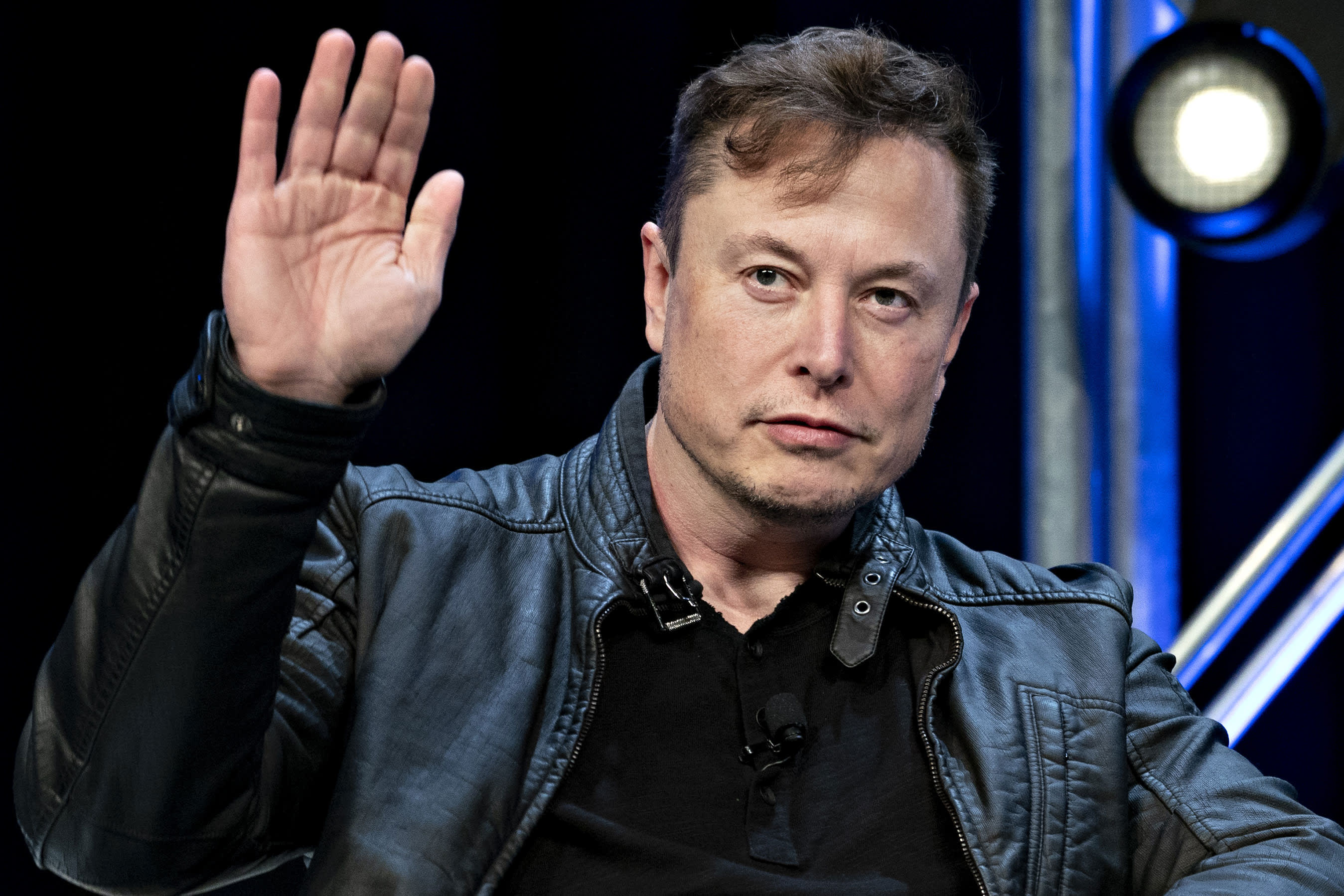Elon Musk endorses a carbon tax, downplays concerns about methane

Elon Musk, founder of SpaceX and chief executive officer of Tesla, waves while arriving to a discussion at the Satellite 2020 Conference in Washington, D.C., on Monday, March 9, 2020.
Andrew Harrer | Bloomberg | Getty Images
Tesla CEO Elon Musk once again endorsed the idea of a federal carbon tax at the company’s 2021 annual shareholder meeting on Thursday.
He said the three parts of a “sustainable future,” in his view, are solar and wind power, batteries for energy storage, and electric vehicles of every kind including cars, boats and airplanes.
“As we move to a sustainable energy grid and electric vehicles, then obviously we move to a fully sustainable energy economy which is where we want to get to as quickly as possible. The sooner the better! And can there be a carbon tax? I mean like, what the hell,” Musk said Thursday, expressing impatience.
A carbon tax, or tax on greenhouse gas emissions, has long been proposed as a way to reduce the emission of gases that cause climate change, particularly carbon dioxide. Some advocates believe that a carbon tax should increase over time to give industry time to discover and roll out lower-carbon alternatives to the products and processes they use that do emit CO2.
More than 40 governments have adopted some sort of price on carbon, according to the New York Times, but the United States has not.
A carbon tax would help Tesla by making gas more expensive, which would make its electric vehicles more attractive, and by increasing energy prices, which could encourage homeowners to adopt solar panels from Tesla and other providers. Musk acknowledged as much, but noted it would hurt his re-usable rocket business, SpaceX, a considerable consumer of fossil fuels that plans to drill for natural gas and to use methane in its rocket operations in Boca Chica.
“So how about a carbon tax? We just really need it,” he said.
Musk also strongly endorsed the idea of getting more materials out of spent batteries through improved recycling technology and processes.
“Battery materials are definitely recyclable. Burning gas is not. CO2 is an extremely stable molecule. Mars’ atmosphere has been primarily CO2 for I don’t know billions of years. It’s extremely stable. So, sometimes people worry about methane. Do not worry too much about methane. Methane quickly breaks down into CO2. Methane is not a stable molecule. CO2 is extremely stable,” Musk urged his audience, as if seeking to justify SpaceX’s use of methane.
According to the Environmental Protection Agency, “Methane is more than 25 times as potent as carbon dioxide at trapping heat in the atmosphere.” Methane is also the second most abundant greenhouse gas emitted through human activity and industry, second after carbon dioxide. It accounts for about 20% of global greenhouse gas emissions.
Austin updates
At the annual shareholder meeting, Musk also spoke about Tesla’s aim to build cars closer to where customers order them. Doing so can save the company shipping costs, but also reduce its environmental footprint from shipping, Musk suggested.
“The sheer amount of money we’re spending on flying parts around the world is not great,” Musk said. “It makes sense to have production on the continent where the consumers are.”
Currently, Tesla has a new factory underway near Austin, Texas, which is expected to produce batteries on-site, and another outside of Berlin, Germany.
On Thursday, Tesla also confirmed that it has moved its headquarters to Austin.
Musk expects the Texas factory, dubbed Giga-Austin, to follow in the footsteps of Tesla’s Shanghai factory, which now produces more electric cars than are made in its original factory in Fremont, California.
At least year’s annual shareholder meeting, Musk proclaimed that battery and manufacturing advances Tesla is working on could soon lead to lower priced cars from the company. “About 3 years from now, we’re confident we can make a very compelling $25,000 electric vehicle that’s also fully autonomous,” he said then. Tesla also said last year that it designed and was producing its own 4680 battery cells at a facility in Fremont, California.
On Thursday, Musk did not give an update on timing for a $25,000 electric vehicle.
But he did say that Tesla would not be producing 4680 battery cells in Texas this year. Instead, it would produce these cells at its pilot facility in Fremont, and ship them to Texas to as Model Y production ramps up there.
Long-term Musk said he believes the crossover utility vehicle is likely to become Tesla’s best-seller, surpassing the Model 3 sedan in popularity.
Earlier this month, Tesla said it delivered 241,300 electric vehicles during the third quarter of 2021, and produced 237,823 cars in the same period.
Deliveries are the closest approximation to sales reported by Tesla. The company achieved a new record as other automakers’ deliveries declined compared to the same time last year, owing largely to supply chain issues including a global chip shortage.
Musk doesn’t see global supply chain issues resolving fully until 2023, he said Thursday.




